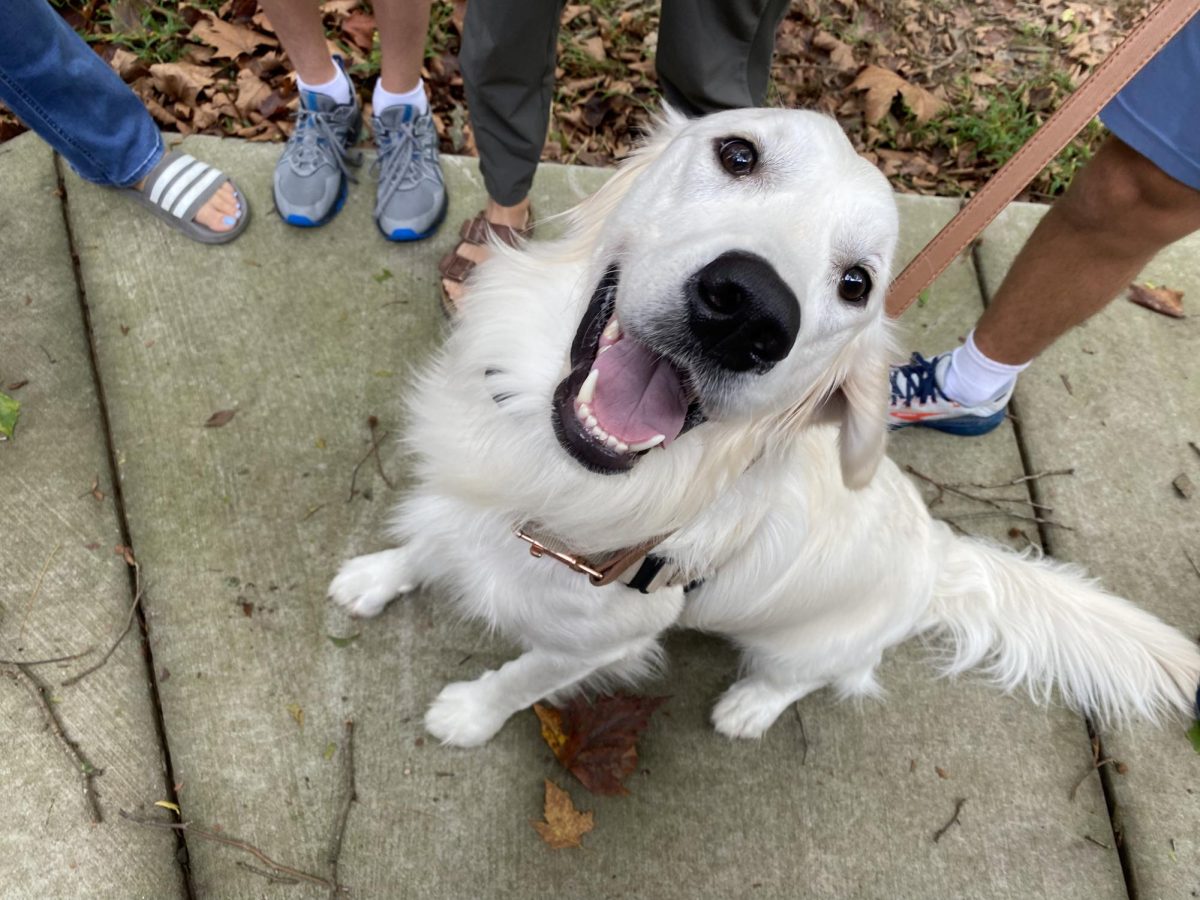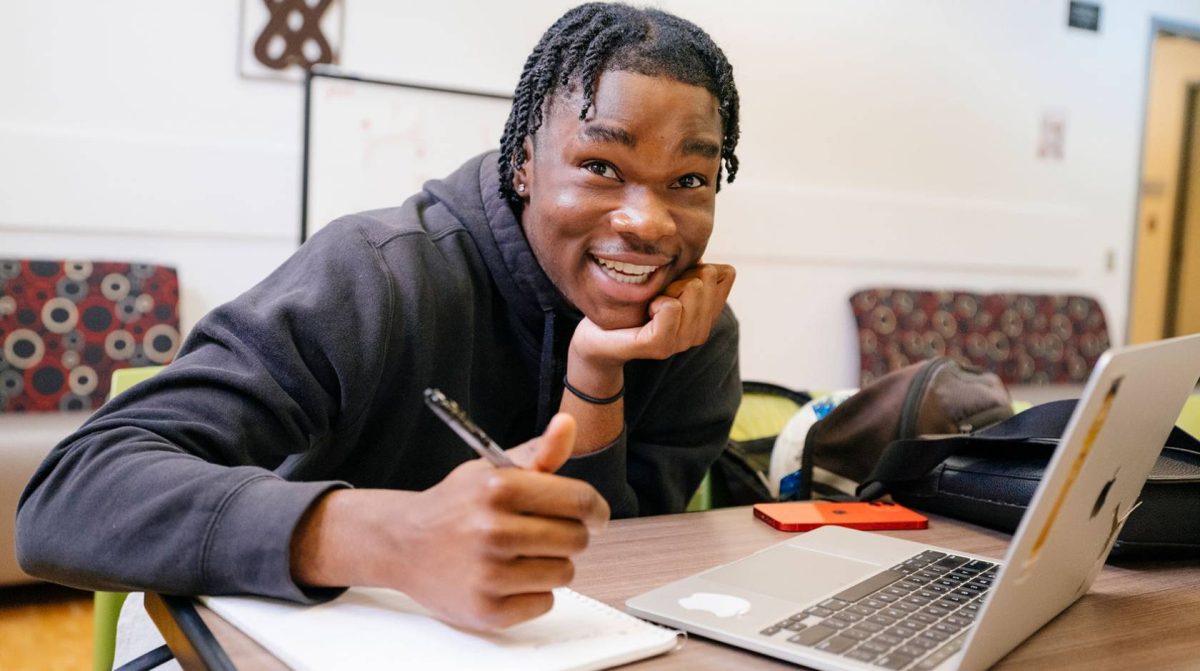For many people, a dog is “man’s best friend.” But for others, their dog is a working employee in their household.
Service dogs are an essential but often overlooked asset to people’s lives throughout the world. While their purpose is to go unseen in order to help their owner, some believe they deserve more recognition than they get.
September is National Service Dog Month. Originally called National Guide Dog Month, this celebration began in 2008 when actor and animal advocate Dick Van Patten launched a fundraising effort to help a guide dog training center in Florida. In 2009, the observation was made official nationally with the assistance of Petco Love.
For the entire month of September, people all around the globe celebrate the service that their four-legged friends have performed throughout the year and throughout their lives.
According to ShareAmerica, there are over 500,000 active service dogs in the United States today. With over 42.5 million people in the United States living with a disability, this means that about 12% of Americans with disabilities have a service dog to help them go about their lives.
Hero Dogs is a local service dog training facility located in Brookeville, Md. working to help that 12% live their lives to the fullest. It opened in 2010 to begin serving the Washington, D.C. metropolitan area.
Hero Dogs has been celebrating National Service Dog Month by attending various events to showcase their dogs and help others learn about the benefits of pets and service dogs.
Executive Director Nikki Charles attended the Washington Nationals game on September 24 with a service dog in training to retrieve the ‘First Fetch’ of the game. Additionally, both Charles and Cooper were able to attend the Assistance Dogs International conference in early September, with Charles being a panelist for the event.
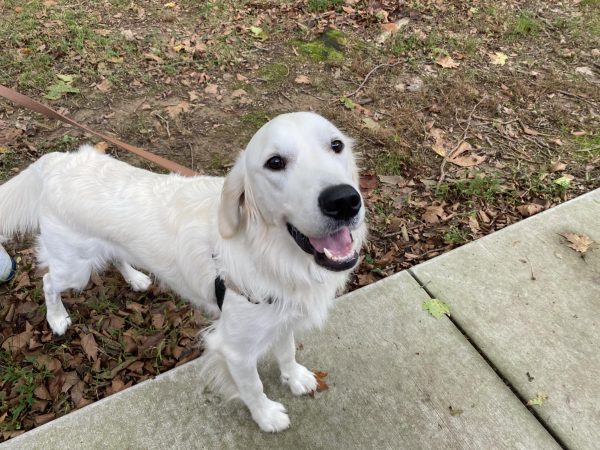
In an interview with the Baltimore Sun in 2015, Jennifer Lund, founder of Hero Dogs, said that she felt she needed to create a service for the greater Washington, D.C. community. She noted that she wanted to be the one to serve the large number of veterans in the Maryland area.
Shannon Dungan helped to originate the organization with her family, serving as the original puppy-sitters of the first Hero Dog. Now, her family is raising Hero Dogs Morty, who is a 16-month-old white golden retriever in training to be placed with a military veteran.
“When this organization first started, the woman who began it was a friend of mine from Mom’s Club, and she had been training dogs,” said Dungan. “She had an idea that she wanted to start an organization to raise service dogs for veterans. And, my husband is a veteran. And so we thought, well, we like dogs and Jennifer [my friend] needs help. So, let’s just do it.”
And “do it” they did. Not only did Dungan’s family puppy-sit the first Hero Dog, they raised the second and kicked off the beginning of a 13-year journey for the family.
The process of training a Hero Dog is a long one. It takes about two years for Hero Dogs to fully train and place a dog. Through their training, the dogs learn all of the basic commands, such as sit, stay or heel. Once the dogs have learned these commands, they are required by Hero Dogs to pass the Canine Good Citizen Test, which is a benchmark test that makes sure they react appropriately to different situations in public and with other dogs.
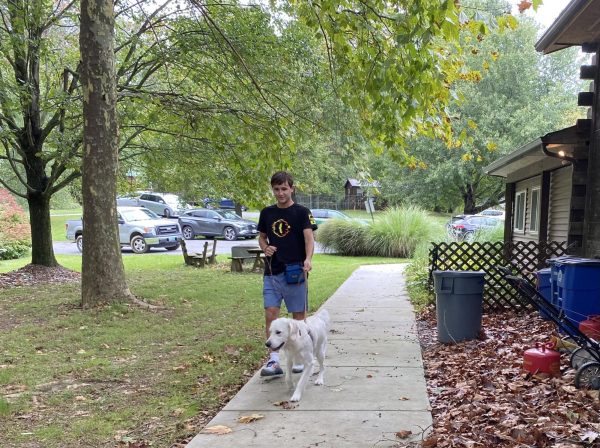
After basic training, dogs may learn more specific skills based on what a veteran might need. Many of the veterans that Hero Dogs serve suffer from PTSD, so the dogs are trained to alert humans to stress signals and help to alleviate symptoms that may present themselves.
If a dog does not pass these tests, they may be “honorably discharged” from the Hero Dogs program. According to the Hero Dogs website, on average only about one in every three dogs will make it through a service dog training program.
Becca Cooper is a dog trainer at Hero Dogs and works with the dogs every day to make sure they are passing their tests and being trained to the highest degree possible.
Before earning a college degree in animal science, Cooper worked at a therapeutic horseback riding barn for children with autism. After seeing the difference it made in their lives and graduating from college, she was drawn to service dog training as a career.
Cooper interned at Hero Dogs during her senior year of college.
“Being able to use my ability to train dogs, and then [to] make a difference in someone’s life in one way or another, is what drew me to stay here [at Hero Dogs] for so long,” said Cooper.
Another facet of the Hero Dogs veteran-serving philosophy is their dog naming process. All dogs a part of the Hero Dogs programs are named after people from every branch of the military. Morty happens to be named after World War II Commander Dudley W. Morton of the U.S. Navy.
Dungan reports that her husband had a large part in Morty’s naming.
“My husband really wanted to name him after a submariner because there are no other Hero Dogs named after a submariner, and that’s what my husband had been [in the Navy],” Dungan said. “So, he’s named after Dudley Morton, who won the Medal of Honor in World War II as a submariner.”
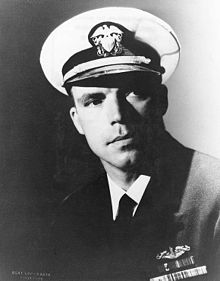
The dogs at Hero Dogs wear vests which contain individualized business cards for each dog. Each card contains a short description of what the dogs are for and information about the Hero Dogs organization, as well as, their names, birthdates and Instagram usernames.
Often confused with therapy dogs, service dogs are dogs that have been specially trained to perform specific tasks in order to help someone with a disability. The vests they wear help to identify the Hero Dogs in training as service dogs.
A vest may help to identify a service dog, but it is actually not required. Service dogs are granted governmental rights just like humans. As stated by the Americans with Disabilities Act, service dogs may be any breed or size of dog, and they are designated to help people with disabilities. They are not mandated to go through any professional certification programs or wear a vest identifying them as a service dog.
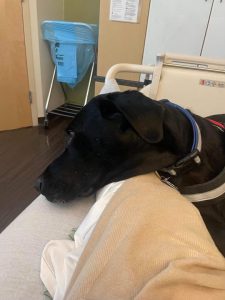
When placing a dog in a home, it is important to think about the relationship between the dog and the human. Charles calls it a sort of “matchmaking” that occurs when placing a dog.
However, in former Howard County music director Jeffry Brodie’s case, he got to make sure that his service dog was just right for him.
Brodie is a very experienced dog trainer and trains dogs for various competitions in which they must obey commands. This expertise helped him when he discovered his own need for a service dog due to a genetic disorder. Brodie suffers from severe muscle myopathy.
After he decided that he wanted to get a service dog, he bought and trained his own dog that was perfect for him. He chose Maggie, a now 7-year-old black labrador retriever, to be his companion.
The muscle myopathy is a genetic mutation that causes Brodie to get sudden and severe muscle cramps in his legs, arms and jaw. He described the pain he experiences from his episodic attacks with no known trigger.
“Cramps have been so severe that they tear the muscles in my legs, and they [the episodes] last for 20 to 30 minutes. And so if [a dog] can give me forewarning, then that’s a great thing,” said Brodie.
Brodie’s dog carries medication in her vest, so if she can predict when an episode might happen, he may be able to prevent having a severe episode of cramps.

After training his dog Maggie, Brodie decided to share the profound impact that having a service dog has had on his life. To do this, he wrote and published a children’s book detailing the different skills and work service dogs do to help their humans daily.
The book called “I Know Things” is sold on Amazon in both hardback and paperback.
A common misconception is that service dogs are working all the time and get no time to relax. On the contrary, as shown by Brodie’s book and a visit to Hero Dogs, all service dogs get plenty of time to just be a dog.
“I mean they go on field trips every day, training outings every day, playtime with all the other dogs in the kennel three times a day for over an hour,” said Charles. “The public’s conceptions of the service dog industry are a little off. These dogs work because they like to work.”
Even though these dogs may enjoy what they do, their focus and attention are often overwhelmed by negligent or uninformed people in public.
Dungan remarked that her training with Morty is frequently interrupted by individuals coming to pet or interact with the dog.
“I can’t tell you the number of times that either I’m out with a dog that’s in training or that I see another service dog and someone goes up and starts interacting. That dog is working,” said Dungan. “When we place them [the dogs] with a veteran and they are in public, they have a job. Please don’t mess with that job. Let them do their job–it’s super important!”
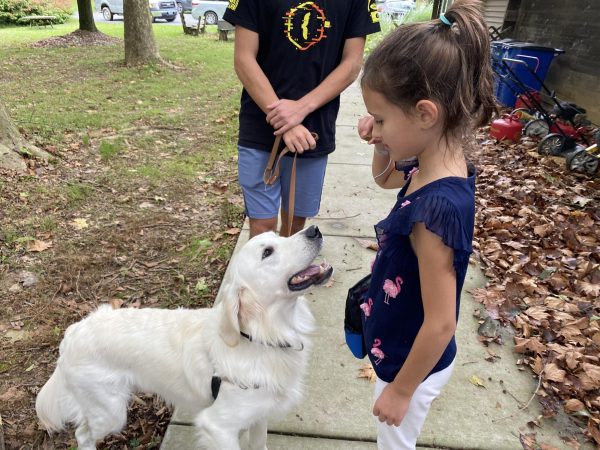
She reported that children often respect the idea of leaving the dog alone more than many adults do. In fact, Dungan’s own children help to train Morty for service. Her 16-year-old son Tyler Crimmins noted that it is extremely fascinating to see the work that Morty does.
“I just like seeing the dogs learn stuff; it’s actually kind of crazy to watch how well they pick up on stuff,” said Crimmins. “I think service dogs and dogs, in general, are a lot smarter than maybe some people realize. It’s really fun to just watch them learn and see the understanding as you’re working with them.”
Tyler is not the only child working with Morty, either. Dungan’s younger son Nate (11) and two daughters, Gabby (14) and Jackie (9), all contribute to the dog-training process as well. Gabby runs the Instagram account for Morty, and Jackie helps to teach Morty basic commands at home.
Nate says that Morty is fun to play with and he loves getting to work with him.
“I’ve worked with him on a couple of [commands], like take it and drop it,” Nate Crimmins said. “[I] come take him for walks sometimes or take him out to use the bathroom…He’s a nice dog, and it’s fun to play with him.”
Overall, everyone in Dungan’s family agrees that raising a service dog has been one of the best ways to say thank you to the people that protect the country day in and day out.
“ It is a lot of time and effort that goes into it, [but] there is a huge payoff at the end, right?” Dungan said. “Because we, as a society, want to say thank you to people for sacrificing so much. But, you’re not going to bring that person dinner every night. You’re not going to go pick that person up and help them go to the mall because the mall makes them anxious. But you can raise a service dog.”
Hero Dogs is always accepting new volunteers and puppy raisers to help them change the lives of veterans across the Washington metropolitan area. Visit their website to learn more about how to get involved and follow their social media @herodogsinc on all platforms.



